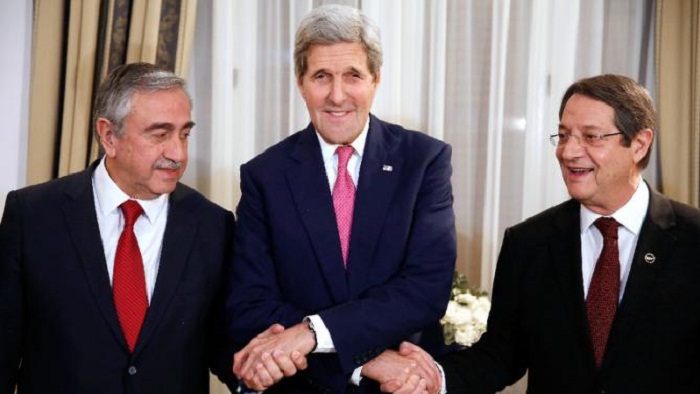Kerry visits divided Cyprus to boost peace talks

Cyprus has been divided since 1974, when Turkish troops invaded and occupied its northern third in response to an Athens-inspired coup seeking union with Greece.
"In recent months it has become clear that the ground really is shifting. And tangible progress is being made," Kerry said after separate talks with the Greek Cypriot and Turkish Cypriot leaders.
"I am more convinced than ever that a resolution to the longstanding division of Cyprus is within reach, and with it, the many benefits of unity for all the people of the island," he said.
A UN-controlled buffer zone -- the "Green Line" -- runs across the island and through Nicosia, Europe`s last divided capital, separating the self-proclaimed Turkish Republic of Northern Cyprus (TRNC) from the Republic of Cyprus.
Kerry met with both Turkish Cypriot leader Mustafa Akinci and his Greek Cypriot counterpart Nicos Anastasiades, who embarked on a new round of peace talks towards reunification after Akinci won elections in April.
"Both leaders underscored something we strongly believe in the United States: not only will a just, comprehensive, and lasting solution for Cyprus have an enormously positive impact on the island, it will lift up the entire region," Kerry said.
"A united Cyprus will stand as a beacon of hope in a tumultuous part of the world at a time when people need that beacon. It will be a model for other places in search of a peaceful, multi-ethnic future.
"With a lasting settlement to this decades-long conflict, Cyprus could also become a regional energy and commercial hub," he said, adding, "We believe this is Cyprus`s moment."
`Cautiously optimistic`
Kerry is the second senior US official to travel to Cyprus after Vice President Joe Biden in 2014 became the highest level American visitor since Lyndon B. Johnson in 1962.
He arrived in Cyprus from Belgrade, where he had taken part in the annual ministerial council of the Organisation for Security and Cooperation in Europe (OSCE).
The visit comes amid an international push for a solution to the Cyprus issue, as UN peace envoy Espen Barth Eide last week announced "further progress" in talks, the most intensive in years.
"They now feel more hopeful and confident that the outstanding issues could be resolved in the near future," the Norwegian diplomat said.
Russian Foreign Minister Sergei Lavrov visited Cyprus on Wednesday, a day after Turkish Prime Minister Ahmet Davutoglu made his first visit to the north since assuming office, expressing his support for a "viable, just and peaceful solution".
Rival leaders have failed to come up with a power-sharing formula for four decades, struggling with issues including lost property, Turkish soldiers in the north and landmine clearance.
But after Akinci was elected on a mandate to pursue further talks, he and Anastasiades announced several confidence-building measures, including a promise to hand over maps detailing 28 Greek Cypriot minefields in the north, scrapping visa requirements for Greek Cypriots and connecting electricity grids.
Ankara and Washington voiced hope that 2015 could be the year that Cyprus was reunited.
Mete Hatay, a TRNC-based political analyst, said he was "cautiously optimistic" but did not expect negotiations to find a solution by the end of the year.
"The negotiations look good, but it`s not easy," he said.
During the Turkish invasion, around 200,000 people fled in a population exchange, Greek Cypriots to the south and Turkish Cypriots to the north, leaving behind their homes and land.
Their lost property -- as well as territory -- will be "the last issues that are going to be on the table," Hatay said.















































